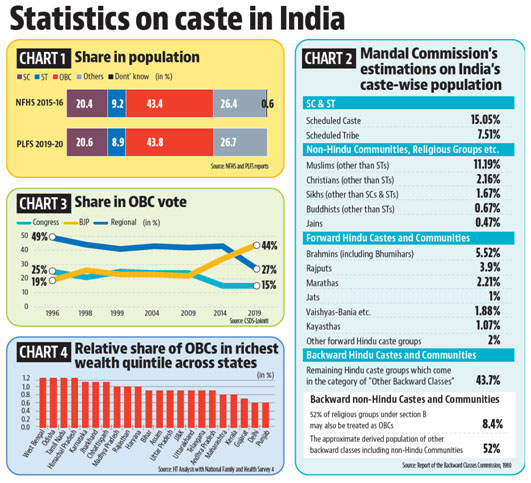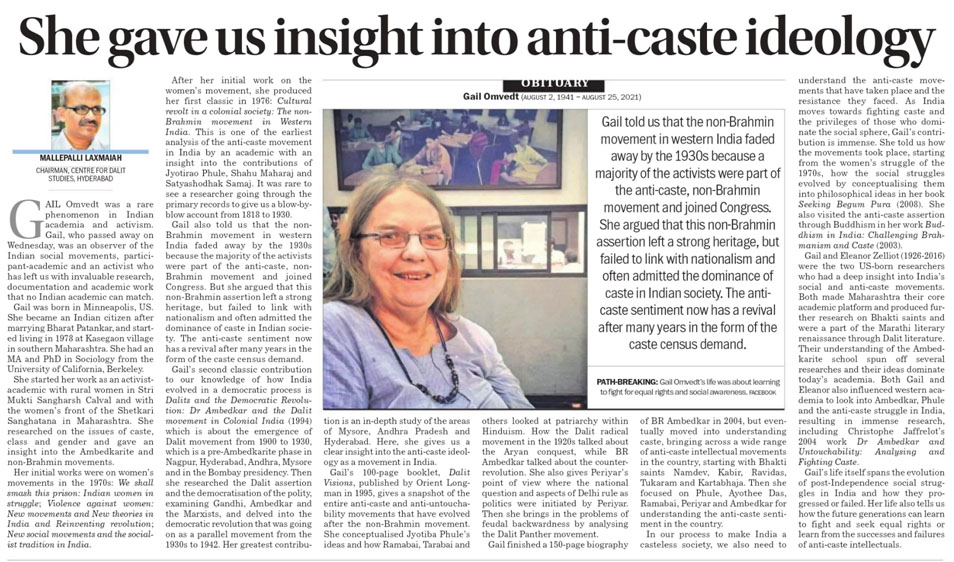Excellent study material for all civil services aspirants - begin learning - Kar ke dikhayenge!
CASTE CENSUS IN INDIA
Read more on - Polity | Economy | Schemes | S&T | Environment
- The story: India has not conducted a caste census after 1931, and only estimates have been used thereafter. The British used to enumerate caste in their decadal censuses between 1881 and 1931. This practice was discontinued thereafter and independent India did not restore it as part of the regular census. Apparently, neither Nehru not Patel were in its favour back then.
- SCs/ STs counted: The religious groups and Scheduled Castes (SCs) and Scheduled Tribes (STs) are counted in decadal census of India. The share of SCs and STs was 21.54% in the 1971 census and gradually increased to 25.26% in the 2011 census. The SC-ST population continues to be the most economically backward in the country, and fertility rates are higher when income levels are lower. So their population is rising. (any population control law will hit SCs and STs also directly)
- Bihar delegation: In August 2021, an all-party delegation from Bihar - led by Chief Minister Nitish Kumar - met PM Modi to demand a caste census in the country. Rashtriya Janata Dal’s Tejashwi Yadav, leader of opposition in the Bihar assembly, suggested that the caste census could be a part of the normal decadal census.
- What about other castes: Various government surveys such as the ones conducted by the National Sample Survey Office (NSSO) and National Family and Health Survey (NFHS) collect data on broad share of SCs, STs and Other Backward Classes (OBCs) in the population. The findings from the latest NFHS and NSSO rounds are shown in image. Interesingly, today’s NFHS-NSSO estimates of caste shares are not very different from what the Mandal Commission Report assumed them to be, based on an extrapolation from the 1931 census numbers.
- Caste-census demands and reservations: Demands for a caste census are deeply linked with the policy of reservations in government jobs and educational institutions.
- There is a continuing quest for including more social groups into the list of those eligible for reservations and demands for relaxing the Supreme Court mandated 50% quota on reservations in India.
- Inclusion of more communities into the reserved category will shrink the probability of the groups which were there earlier gaining from reservations. The Mandal Commission’s recommendation of providing 27% reservations for OBCs was a direct result of the 50% cap on reservations.
- The report said that - "the population of OBCs, both Hindu and non-Hindu, is around 52% of the total population of India. Accordingly 52% of all posts under the Central government should be reserved for them. But this provision may go against the law laid down in a number of Supreme Court judgments wherein it has been held that the total quantum of reservation under Articles 15(4) and 16(4) of the Constitution should be below 50%. In view of this, the proposed reservation for OBCs would have to be pegged at a figure which when added to 22.5% for SCs and STs, remains below 50%. In view of this legal constraint, the Commission is obliged to recommend a reservation of 27% only, even though their (OBC) population is almost twice this figure.”
- Other Backward Classes not 'Castes': OBCs, in the realm of politics, are seen as a social group. This changes when it comes to constitutional provisions for reservations. Constitutionally, OBC reservations are not at par with reservations for SC-ST groups in India. The biggest proof of this is the fact that unlike in the case of the SC-ST population, OBCs belonging to the creamy layer – a threshold which looks at various things, but primarily income limits – cannot avail of reservations. This underlines the importance of class rather than a simple caste aspect when it comes to OBC reservations.
- Reservations and OBC politics: Government informed the Parliament that “representation of SCs and STs is more than the prescribed percentage of reservation, (15% and 7.5%, respectively). The representation of OBCs in the Central Government services is 21.57%, which is less than prescribed. Reservation of Other Backward Classes (OBC) has shown an increasing trend since it started in September, 1993. Representation of OBCs, as on 1.1.2012, was 16.55%, which has increased to 21.57%, as on 01.01.2016”. The gap in knowledge is the extent to which these benefits have helped sub-castes within the larger group currently classified as OBCs. That's why the government set-up the Justice Rohini Commission on sub-categorization of OBCs in 2017.
- There are 2,633 Other Backward Castes in the Central List and earlier this year the commission proposed to divide them into four subcategories numbered 1, 2, 3 and 4 and split the 27% into 2, 6, 9 and 10%, respectively.
- If accepted, the recommendations are likely to have a major impact on politics, especially in north India where the rise of powerful OBC groups such as Yadavs defined the 1990s.
- The recommendations of the Justice Rohini Commission will unleash a major political churn, as dominant OBCs, who the commission believes have benefitted disproportionately from the current policy, might end up losing their advantage within the broad OBC group.
- Equality within OBCs: The fact that OBC reservations must also take into account class and not just caste, and the current government has already set the ball rolling for restructuring the existing 27% OBC reservations, means that a simple enumeration of OBCs along with SC-ST groups in the census will not help the cause of equality among OBCs. What's needed also is economic status of various sub-castes, which is not possible in the census. This is something the Socio-Economic Caste Census of 2011 promised to do. But its findings were never released. Actually, intra-caste divisions can play a bigger role in creation of inequality than inter-caste factors. It is true that upper castes are most well off and STs the worst off, but intra-caste or jati based trends do not always conform to this hierarchy.
- Evidence from larger surveys such as the NFHS underlines the prevalence of differentiation in economic status of OBCs across India’s states.
- These numbers show that the politically convenient demand for clubbing a caste census with the normal census, and using it to justify either a reorganization or expansion of OBC reservations, might help politically, but will not necessarily make India a more egalitarian state.
- Summary: If such a comprehensive caste census with economic attributes is conducted, the country could have a huge social-political disruption to deal with.
- Holding that annual earning cannot be the sole criteria for identifying creamy layer between backward class to deny reservation, the Supreme Court held that it has to be done on the basis of social economic and other relevant factors and not only economic criteria.
- The S.C. quashed the 2016 notification issued by the Haryana government by which sections of backward classes earning above Rs.6,00,000 per annum were to be considered as a creamy layer, whereby the state wrongly sought to determine creamy layer solely on the basis of economic practice.
- The SC said that the decision of the state government was in violation of the principles laid down by the apex court in Indra Sawhney case. In "Indra Sawhney case", the court held that persons from backward classes who occupied posts in higher services like IAS, IPS and all India services had reached a higher level of social advancement and economic status and therefore were not entitled to be treated as backward.
- Such persons were to be treated as creamy layer without any further enquiry. Likewise people with sufficient income who are in a position to provide employment to others should also be taken to have reached a higher social status and therefore should be treated as outside the backward class.
- Similarly, persons from backward classes who had higher agricultural holdings or were receiving income from property beyond the prescribed limit do not deserve the benefit of reservation. The above mentioned categories were necessary to be excluded from backward classes.
* Content sourced from free internet sources (publications, PIB site, international sites, etc.). Take your own subscriptions. Copyrights acknowledged.
















